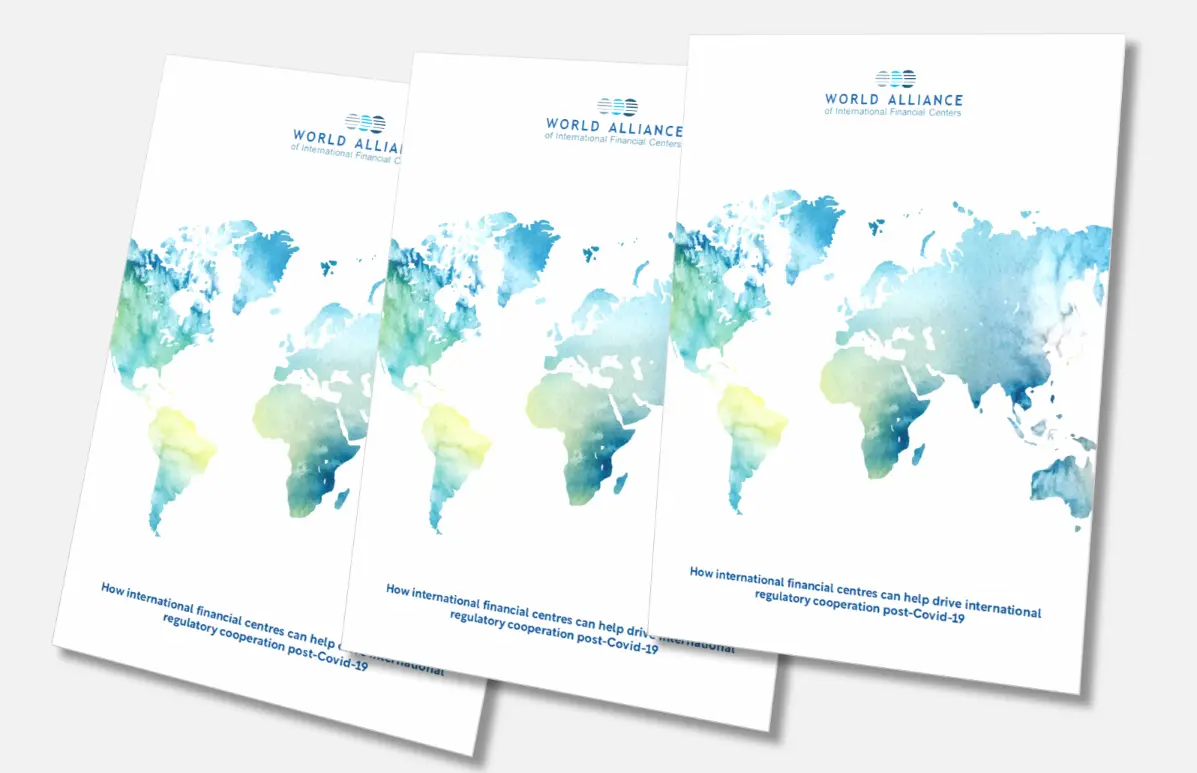
WAIFC Publication on "How international financial centers can help drive international regulatory cooperation post-COVID-19"
A new report from the World Alliance of International Financial Centers (WAIFC) urges governments and regulators to do more to coordinate their activities to support the global economic recovery from the COVID-19 pandemic.
The report, 'How international financial centers can help drive international regulatory cooperation post-COVID-19,' makes the case for why regulatory cooperation is crucial to facilitate the growth of capital.
The report explains how the necessary actions that national governments and regulators took to support domestic businesses and address the health crisis could now lead to new unintended international barriers to the free flow of capital and the operation of global financial markets.
To address these challenges, the WAIFC report outlines several principles which could guide regulatory cooperation in the years ahead to smooth the global economic recovery, improve the functioning of financial markets and unlock more capital for investment. These methods, where appropriate, include:
- Recognition: Host country regulators could recognize the home country regulator's standards as valid where both have high standards and seek the same outcomes, even if they try to achieve them in different ways. Mutual recognition between countries should be an important objective.
- Substituted compliance: Host regulators could permit foreign regulated institutions and services whose activities might bring them within the scope of the regulator's jurisdiction to show compliance with their home jurisdiction regulations as a substitute for compliance with the host country's regulations.
- Exemptive relief: Host country regulators could grant financial institutions from another country exemption from compliance with some of their regulations if the home country regulatory regime is deemed adequately similar to that of the host country on the issue in question.
- Equivalence: governments could accept one another's regulatory rules as valid on the grounds that they are equivalent to their own, i.e., substantially the same in terms of outcomes in practice, if not necessarily identical in form.
Commenting on the release of this report, Jennifer Reynolds, Chair of the WAIFC, said:
"Our members are united in calling for increased international regulatory cooperation, whether at a global, regional or bilateral level, to create more integrated global financial markets and support greater economic growth."
Miles Celic, Member of the WAIFC Board and CEO at TheCityUK, said:
"Financial markets are some of the most internationally integrated systems in existence, yet all too often they don't fully benefit from scale, as products and services are prevented from freely crossing borders and reaching the customers that need them. Firms are eager to engage and provide industry input into international regulatory dialogues to help regulators achieve more global financial stability and more integrated global financial markets."
Dr. Jochen Biedermann, Managing Director of the WAIFC, added:
“This report highlights the advantages of greater international regulatory alignment. It makes clear that through greater cooperation we can deliver real economic benefits to customers and clients, while avoiding any weakening of standards, or undermining international financial stability.”
You can download the report at https://waifc.finance/publications/.
The World Alliance of International Financial Centers (WAIFC) is a non-profit association registered in Belgium, representing 20 leading international financial centers of four continents. WAIFC members are city governments, associations, and similar institutions developing and promoting their financial centers.
WAIFC facilitates cooperation between its members, the exchange of best practices, and communication with the general public.
